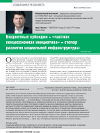Budget Subsidies + “Private Concession Initiative” = Stopper for Social Infrastructure Development
DOI: https://doi.org/10.33917/es-6.180.2021.30-39
The overwhelming majority of social infrastructure facilities remain in state ownership, requiring special formats for attracting private investment without possibility of disposition and loss of their destination. Mechanism of public-private partnership doesn’t leave any other option for such projects, and the “private concession initiative”, which has become widespread in recent years, is best suited for projects focused on commercial activities, although this limits its application to social facilities. Non-competitive basis of this format relies on the market offer of the investor, whose rationality does not imply social behavior and whose activity is obviously not intended for budgetary participation. Recently, there has been an increase in cases of government authorities taking commitments on budgetary co-financing of agreements concluded as a result of such initiatives, which is often fraught with systemic violations of budgetary legislation. Connivance of the control-supervisory and judicial authorities results in formation of skewed law enforcement practice, in 36.2% of projects investors receive
additional rental income from the budget, objectively not justified. This not only results in budget overpayments, but also devalues competitive formats that were previously quite successful — at present only 1/5 of social projects are concluded through a competitive process.
Источники:
1. Kireeva A.V. Sovremennye problemy institutsional’nogo regulirovaniya ekonomicheskikh otnoshenii v sfere gosudarstvenno-chastnogo partnerstva [Modern Problems of Institutional Regulation of Economic Relations in the Field of Public-Private Partnership]. Vestnik Evraziiskoi nauki, 2020, no 4, available at: https://esj.today/PDF/56ECVN420.pdf.
2. Kudelich M.I. Pryamoe soglashenie v proektakh s gosudarstvennym uchastiem: sravnitel’no-pravovoi analiz [Direct Agreement in Projects with State Participation: Comparative Legal Analysis]. Finansovyi zhurnal, 2019, no 6, pp. 57–69, available at: DOI: https://doi.org/10.31107/2075-1990-2019-6-57-69.
3. Ponomarev R.V. Osobennosti regulirovaniya kontsessionnykh soglashenii v zarubezhnykh stranakh [Peculiarities of Regulating Concession Agreements in Foreign Countries]. Innovatsii i investitsii, 2015, no 8, pp. 66–70.
4. Istomina N.A. Konkurentsiya za byudzhetnye sredstva v kontseptsii byudzhetirovaniya, orientirovannogo na rezul’tat [Competition for Budgetary Funds in the Concept of Performance-Based Budgeting]. Finansovaya analitika: problemy i resheniya, 2014, no 29, pp. 41–47.
5. Gavrilova Yu.A. Monitoring praktiki primeneniya zakonodatel’stva o kontraktnoi sisteme i perspektivy ego sovershenstvovaniya [Monitoring the Practice of Applying Legislation on the Contract System and Prospects for Its Improvement]. Monitoring pravoprimeneniya, 2019, no 3, pp. 36–42, available at: DOI: https://doi.org/10.21681/2226-0692-2019-3-36-42.
6. Belozor F.I. Zakupki dlya gosudarstvennykh nuzhd: garmonizatsiya dobrosovestnoi konkurentsii i ekonomicheskoi effektivnosti [Public Procurement: Harmonizing Fair Competition and Economic Efficiency]. Gosudarstvennoe i munitsipal’noe upravlenie. Uchenye zapiski, 2021, no 1, available at: DOI: https://doi.org/10.22394/2079-1690-2021-1-1-93-101.
7. Borodatova L.Yu. Razvitie sotsial’noi infrastruktury v ekonomicheskom prostranstve: teoreticheskii aspect [Developing Social Infrastructure in the Economic Space: Theoretical Aspect]. Sovremennye problemy nauki i obrazovaniya, 2013, no. 2, pp. 359.
8. Maximov V.V. Dilemma sotsial’nogo vybora pri zaklyuchenii kontsessionnykh soglashenii [Social Choice Dilemma in Concluding Concession Agreements]. Ekonomicheskie strategii, 2021, no 5, pp. 16–27, available at: DOI: https://doi.org/10.33917/es-5.179.2021.16-27.
9. Maximov V.V. Paradoksy sotsial’noi politiki v razvitii sotsial’noi infrastruktury [Paradoxes of Social Policy in Developing Social Infrastructure]. Ekonomicheskie strategii, 2021, no 2, pp. 38-44, available at: DOI: https://doi.org/10.33917/es-2.176.2021.38-44.
10. Informatsionno-analiticheskii obzor “O razvitii gosudarstvenno-chastnogo partnerstva v Rossiiskoi Federatsii” [Information and Analytical Review “On the Development of Public-Private Partnership in the Russian Federation”]. Minekonomrazvitiya Rossii, 2020, February, available at: https://www.economy.gov.ru/material/file/6b5f12f3140cf044f1f715d18dfdef0a/gchp%2021.02.2020.pdf.
11. Maximov V.V. Dostupnaya sotsial’naya infrastruktura vs gosudarstvenno-chastnoe partnerstvo [Affordable Social Infrastructure vs Public-Private Partnership]. Uroven’ zhizni naseleniya regionov Rossii, 2021, no 2, pp. 271–285, available at: DOI: https://doi.org/10.19181/lsprr.2021.17.2.11.
12. Otchet Schetnoi palaty Rossiiskoi Federatsii o rezul’tatakh ekspertno-analiticheskogo meropriyatiya “Monitoring razvitiya sistemy gosudarstvennykh i korporativnykh zakupok v Rossiiskoi Federatsii za 2020 god” (utverzhden Kollegiei Schetnoi palaty Rossiiskoi Federatsii 22 iyunya 2021 g.) [Report of the Accounts
Chamber of the Russian Federation on Results of the Expert-Analytical Event “Monitoring Development of the System of Public and Corporate Procurement in the Russian Federation for 2020” (Approved by the Board of the Accounts Chamber of the Russian Federation on June 22, 2021)]. Schetnaya palata Rossiiskoi Federatsii, 2021, July, 8, available at: https://ach.gov.ru/upload/iblock/123/442w02xo0vq4unq199jwxnr9mpow972c.pdf.
13. Marinicheva A.Yu. O prokurorskom nadzore za soblyudeniem prav predprinimatelei v sfere realizatsii gosudarstvennykh i munitsipal’nykh kontraktov [On the Prosecutor’s Supervision Over the Observance of the Entrepreneurs Rights in the Sphere of Implementation of State and Municipal Contracts]. Ugolovnaya yustitsiya, 2019, no 14, pp. 123–129, available at: DOI: https://doi.org/10.17223/23088451/14/25.
14. Lapo V.F. Otsenka mezhregional’noi konkurentsii za investitsii s privlecheniem zakonodatel’nykh metodov stimulirovaniya [Assessment of Interregional Competition for Investment Involving Legislative Incentive Methods]. Ekonomika regiona, 2020, Vyp. 2, pp. 649–665, available at: DOI: https://doi.org/10.17059/2020-2-24.



